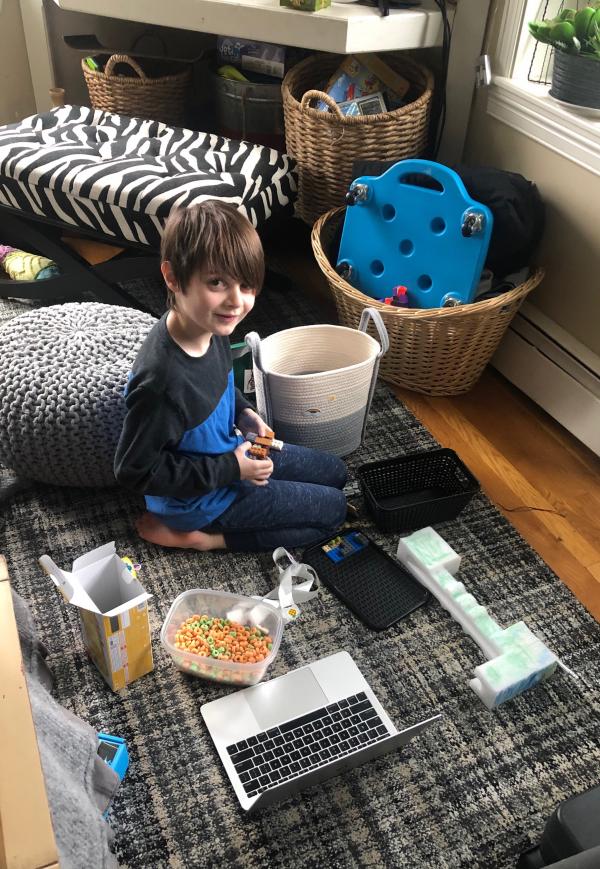March 26, 2020

A Boston Sensory Solutions patient interacted with his therapist via laptop during a telehealth occupational therapy session last week. Photo courtesy BSS
As the COVID-19 outbreak has continued to change business models in various industries, many health professionals have been forced to adapt quickly and efficiently in order to maintain vital services for patients. Boston Sensory Solutions, a Milton-based pediatric occupational therapy, speech therapy, and sensory integration provider, was among the first businesses to convert to “telehealth” last week, closing their physical location and moving all services to Doxy, an online video telemedicine platform.
Bridget Dujardin, a Dorchester resident who founded the company in her Melville Park basement and later operated out of a yoga studio near Neponset Circle before leasing space in Milton, told the Reporter she sensed things beginning to move toward the transition weeks ago.
“As this whole COVID-19 thing seemed to be ramping up, we started wondering about, with all this shared equipment we have, how do we keep people safe? We see most kids once a week, so to just pull that out from under them, especially at a time when people need more support around anxiety and maintaining routines, it seemed like a bad decision from a clinical perspective.”
After Governor Charlie Baker announced last Sunday that all commercial insurers will cover telehealth appointments for all treatments, Dujardin and her team made the decision to close up shop and work remotely. That meant all appointments would now be livestreamed on Doxy, a free service which families can access at home on phones, tablets, or laptops. Dujardin, who compared the experience to a Facetime call, explained that the transition to telehealth has had its drawbacks, but also some unexpected benefits.
“I think the biggest challenge for us is not being right there in the same room as the kid,” said Dujardin. “We’re very hands-on practitioners, and we work with kids with a lot of movement activities and coping skills. Trying to engage them to participate on a screen instead of in the clinic is tricky. But keeping parents involved, and having them be our hands has been really helpful. We’ve found that families who participate in the session are seeing good results.”
Dujardin added that the nature of her profession--one that demands flexibility and creativity--makes the transition less daunting.
“As occupational therapists, our primary job--even before COVID--has been to meet our patients where they’re at. I think we’re uniquely positioned as a profession to meet this challenge. Our job is to accommodate the situation to make the environment most conducive to the patient--we’re constantly adjusting and adapting.”
But while children who are patients at Boston Sensory Solutions have seen minimal disruption in their therapy sessions, the same cannot be said for children who rely on those sessions through Boston Public Schools, Dujardin pointed out.
“One other thing we’re just starting to think about is how we can best support kids who might have been getting OT or speech at school now that school isn’t happening--it’s sort of this whole other layer. With schools closed, they’re not required to provide those therapeutic services, which means all those kids are all of a sudden no longer getting it. We’re trying to figure out how to translate those to things parents can do at home.”
Like many others, Dujardin at the moment is juggling continuing her company’s services for roughly 100 families, retaining her staff, and keeping her business afloat. But being able to stay busy has helped keep her mind preoccupied and further validated her work, she noted.
“Honestly, it’s been really fun. It’s challenging but I feel a bit removed from the disease and all the stress associated with it because I’m focused on making this transition happen. It’s a nice way to be engaged and be proactive in this situation. We’re part of the solution: by moving to telehealth we could remove a lot of the interactions between people that happen just in our waiting room, and we’re also helping families...part of the role of an OT is maintaining daily structure--how are you filling your time with things that are therapeutic to you, talking about managing time at home to keep healthy and emotionally strong. We’re not just sitting around wringing our hands, we’re helping ourselves and families to stay well-centered.”



